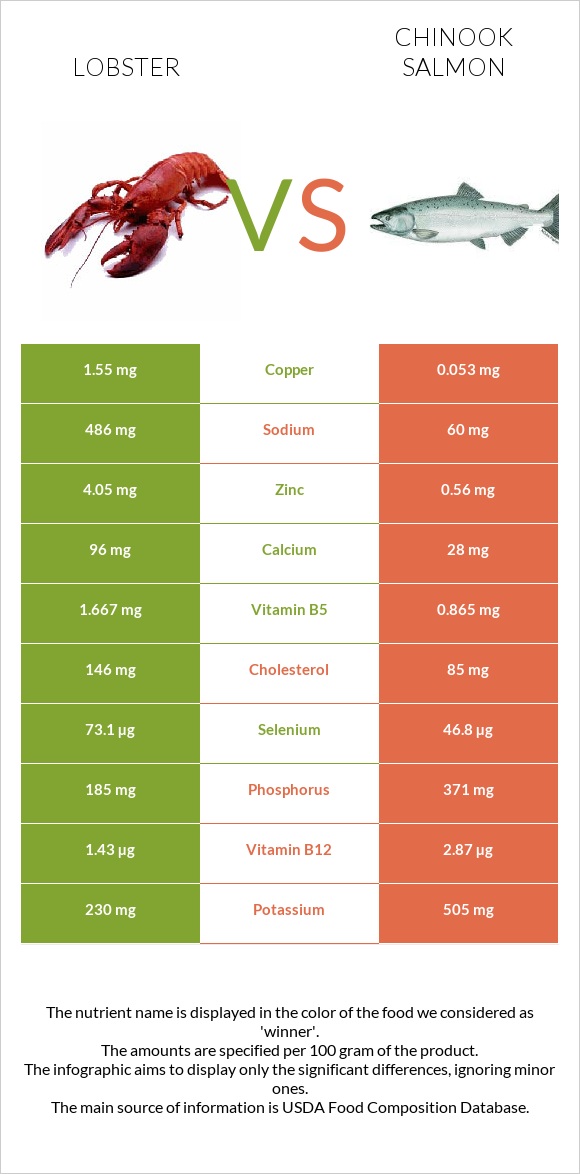Lobster vs. Chinook salmon — In-Depth Nutrition Comparison
Compare
How are lobster and chinook salmon different?
- Lobster is richer in copper, selenium, and zinc, while chinook salmon is higher in vitamin B12, vitamin B3, phosphorus, vitamin B6, and magnesium.
- Lobster covers your daily need for copper, 166% more than chinook salmon.
- Lobster contains 8 times more sodium than chinook salmon. Lobster contains 486mg of sodium, while chinook salmon contains 60mg.
Crustaceans, lobster, northern, cooked, moist heat and Fish, salmon, chinook, cooked, dry heat types were used in this article.
Infographic

Infographic link
Mineral Comparison
Mineral comparison score is based on the number of minerals by which one or the other food is richer. The "coverage" charts below show how much of the daily needs can be covered by 300 grams of the food.
| Contains more CalciumCalcium | +242.9% |
| Contains more CopperCopper | +2824.5% |
| Contains more ZincZinc | +623.2% |
| Contains more ManganeseManganese | +242.1% |
| Contains more SeleniumSelenium | +56.2% |
| Contains more MagnesiumMagnesium | +183.7% |
| Contains more PotassiumPotassium | +119.6% |
| Contains more IronIron | +213.8% |
| Contains more PhosphorusPhosphorus | +100.5% |
| Contains less SodiumSodium | -87.7% |
Vitamin Comparison
Vitamin comparison score is based on the number of vitamins by which one or the other food is richer. The "coverage" charts below show how much of the daily needs can be covered by 300 grams of the food.
| Contains more Vitamin EVitamin E | +∞% |
| Contains more Vitamin B5Vitamin B5 | +92.7% |
| Contains more Vitamin CVitamin C | +∞% |
| Contains more Vitamin AVitamin A | +14800% |
| Contains more Vitamin B1Vitamin B1 | +91.3% |
| Contains more Vitamin B2Vitamin B2 | +805.9% |
| Contains more Vitamin B3Vitamin B3 | +448.9% |
| Contains more Vitamin B6Vitamin B6 | +288.2% |
| Contains more Vitamin B12Vitamin B12 | +100.7% |
| Contains more FolateFolate | +218.2% |
All nutrients comparison - raw data values
| Nutrient |  |
 |
DV% diff. |
| Copper | 1.55mg | 0.053mg | 166% |
| Vitamin B12 | 1.43µg | 2.87µg | 60% |
| Vitamin B3 | 1.83mg | 10.045mg | 51% |
| Selenium | 73.1µg | 46.8µg | 48% |
| Zinc | 4.05mg | 0.56mg | 32% |
| Phosphorus | 185mg | 371mg | 27% |
| Vitamin B6 | 0.119mg | 0.462mg | 26% |
| Cholesterol | 146mg | 85mg | 20% |
| Fats | 0.86g | 13.38g | 19% |
| Magnesium | 43mg | 122mg | 19% |
| Sodium | 486mg | 60mg | 19% |
| Vitamin A | 1µg | 149µg | 16% |
| Vitamin B5 | 1.667mg | 0.865mg | 16% |
| Choline | 80.9mg | 15% | |
| Polyunsaturated fat | 0.34g | 2.662g | 15% |
| Saturated fat | 0.208g | 3.214g | 14% |
| Monounsaturated fat | 0.253g | 5.742g | 14% |
| Protein | 19g | 25.72g | 13% |
| Vitamin B2 | 0.017mg | 0.154mg | 11% |
| Potassium | 230mg | 505mg | 8% |
| Iron | 0.29mg | 0.91mg | 8% |
| Calories | 89kcal | 231kcal | 7% |
| Calcium | 96mg | 28mg | 7% |
| Vitamin E | 1mg | 7% | |
| Folate | 11µg | 35µg | 6% |
| Vitamin C | 0mg | 4.1mg | 5% |
| Manganese | 0.065mg | 0.019mg | 2% |
| Vitamin B1 | 0.023mg | 0.044mg | 2% |
| Vitamin D | 1 IU | 0% | |
| Trans fat | 0.013g | N/A | |
| Tryptophan | 0.248mg | 0.288mg | 0% |
| Threonine | 0.753mg | 1.127mg | 0% |
| Isoleucine | 0.832mg | 1.185mg | 0% |
| Leucine | 1.376mg | 2.09mg | 0% |
| Lysine | 1.426mg | 2.362mg | 0% |
| Methionine | 0.475mg | 0.761mg | 0% |
| Phenylalanine | 0.782mg | 1.004mg | 0% |
| Valine | 0.852mg | 1.325mg | 0% |
| Histidine | 0.475mg | 0.757mg | 0% |
| Omega-3 - EPA | 0.117g | 1.01g | N/A |
| Omega-3 - DHA | 0.078g | 0.727g | N/A |
| Omega-3 - ALA | 0.05g | N/A | |
| Omega-3 - DPA | 0.006g | 0.296g | N/A |
| Omega-3 - Eicosatrienoic acid | 0.006g | N/A | |
| Omega-6 - Dihomo-gamma-linoleic acid | 0.006g | N/A | |
| Omega-6 - Eicosadienoic acid | 0.006g | N/A | |
| Omega-6 - Linoleic acid | 0.033g | N/A |
Macronutrient Comparison
Macronutrient breakdown side-by-side comparison
Protein:
19 g
Fats:
0.86 g
Carbs:
0 g
Water:
78.11 g
Other:
2.03 g
Protein:
25.72 g
Fats:
13.38 g
Carbs:
0 g
Water:
65.6 g
Other:
0 g
| Contains more WaterWater | +19.1% |
| Contains more OtherOther | +∞% |
| Contains more ProteinProtein | +35.4% |
| Contains more FatsFats | +1455.8% |
~equal in
Carbs
~0g
Fat Type Comparison
Fat type breakdown side-by-side comparison
Saturated fat:
Sat. Fat
0.208 g
Monounsaturated fat:
Mono. Fat
0.253 g
Polyunsaturated fat:
Poly. Fat
0.34 g
Saturated fat:
Sat. Fat
3.214 g
Monounsaturated fat:
Mono. Fat
5.742 g
Polyunsaturated fat:
Poly. Fat
2.662 g
| Contains less Sat. FatSaturated fat | -93.5% |
| Contains more Mono. FatMonounsaturated fat | +2169.6% |
| Contains more Poly. FatPolyunsaturated fat | +682.9% |





